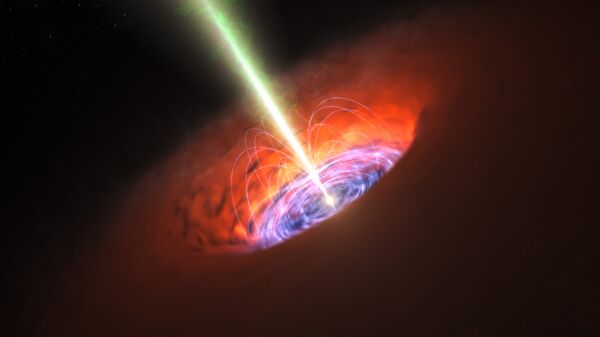The astronomers say our galaxy may be full of black holes that zip across the galaxy at speeds faster than that of a bullet, Science Alert reported Friday.
Black holes have typically been thought of as supermassive stars that have collapsed in on themselves after a supernova explosion and therefore retain their velocity and trajectory. However, scientists now say that black holes can be violently propelled across the galaxy as a result of a supernova recoil – an effect known as the Blaauw kick, or ‘natal’ kick. This effect has previously been observed in neutron stars and now scientists say black holes are prone to the same affect. Black holes launched by a Blaauw kick can travel at speeds of up to 70 km per second, Science Alert says.
In their study, a group of scientists from Curtin University and the International Centre for Radio Astronomy Research (ICRAR) analyzed orbits of 16 dual star systems, in which one star collapsed and formed a black hole. Binary systems were chosen because black holes cannot be detected in visible light wavelengths. However, when a black hole absorbs a nearby star’s mass, it emits powerful x-rays, which are detectable from Earth.
"We tracked how these systems were moving in our galaxy - so, figured out their velocities today, moved back in time, and tried to understand what the velocity was of the system when it was born, individually for each of these 16 systems," said Pikky Atri, an ICRAR astronomer. "Based on the velocities, you can actually find out if they were born with a supernova explosion, or if the stars just directly collapsed onto themselves without a supernova explosion."
The study revealed that 12 out of the 16 systems studied - a remarkable 75 percent - displayed high velocities that potentially indicate that a natal kick occurred in the past.
Considering that there are - according to some estimates - 10 million black holes in our galaxy (a widely-accepted speculation, although the figure could be as high as 1 billion, according to NASA), then 7.5 million black holes are potentially speeding like mad across the galaxy at this moment.
There is no need to panic, astronomers allow, or expect a stray black hole to suck our planet into its inescapable event horizon.
"The closest black hole, we think it's two kiloparsecs away [6,523 light-years]," Atri said, according to Science Alert. "It's very, very far away. So there's no chance that we're getting sucked up by any black hole any time soon."



